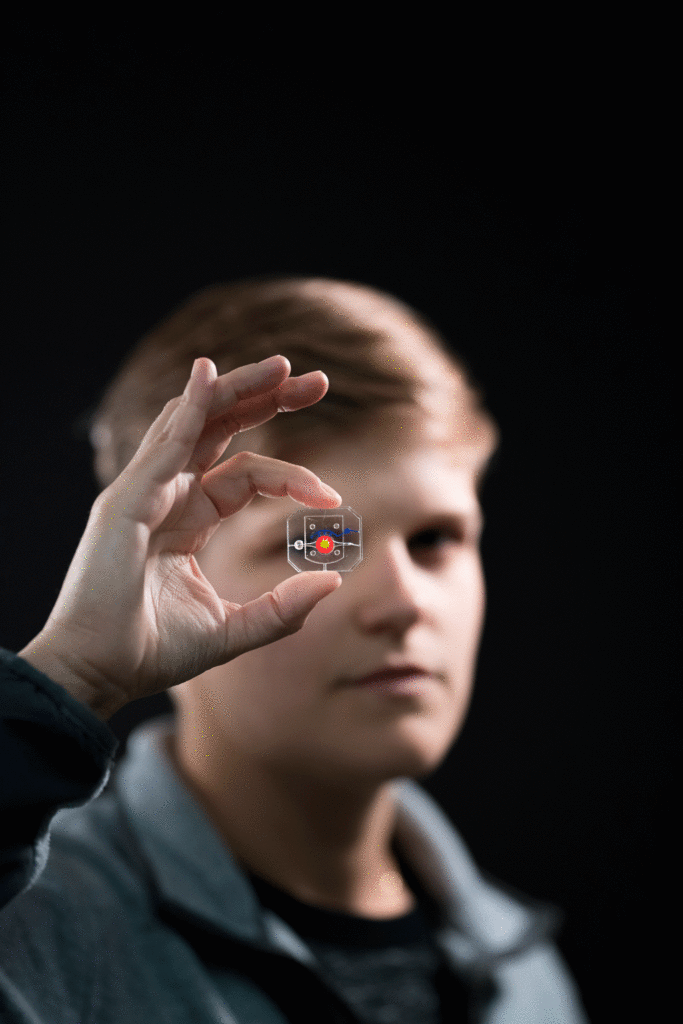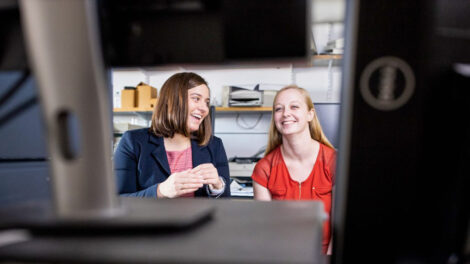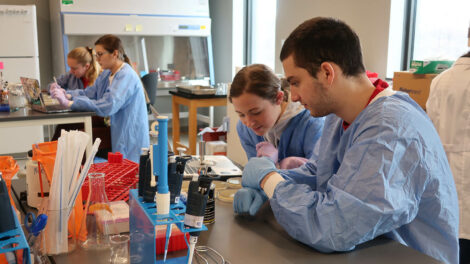Second Clare Boothe Luce grant supports 48 research opportunities for women over the span of three years
By Jill Spotz
The Henry Luce Foundation has awarded a $243,276 grant to Lafayette College through its Clare Boothe Luce (CBL) Program for Women in STEM. This three-year grant will support 48 female undergraduate research scholars majoring in engineering through faculty-mentored research, along with related programs and activities. Of the 48 scholars, 24 will be supported by the College.
This prestigious and timely award comes as Lafayette celebrates the 50th anniversary of women at the College. It will support Lafayette’s continued efforts to provide opportunities for women while partnering with a national leader to shape women’s role in STEM fields. The grant also will advance an inclusive culture for the education of women engineers, with an emphasis on supporting the success of women of color. This award is the second grant received from the Henry Luce Foundation to support CBL Scholars. In 2016, Lafayette received a $150,000 grant from the Clare Boothe Luce Program as well as funding from Heidi Ludwick Hanson ’91 and Daniel Hanson and the William T. Morris Foundation, which provided 50 summer research opportunities, graduate school preparation, and participation at national conferences. The program was so successful that it was extended to a fourth summer in 2019, with supplemental support provided by the College and the above-mentioned external funders.
New to the program this year, CBL Scholars will be supported throughout the academic year as opposed to the summer only. They also will have the opportunity to mentor female K–12 students through the Landis Center for Community Engagement to help boost the pipeline of women pursuing engineering. In addition, an “ally” component will encourage participants’ male peers to reinforce a broader culture of equity and inclusion.
“The ally component will formalize the connections between students in the CBL and EXCEL programs” says co-director of the CBL Program Lauren Sefcik Anderson ’04, associate professor and department head, chemical and biomolecular engineering.
“This initiative will help to facilitate conversations between men and women about working together effectively. In most engineering disciplines, there are typically more men than women, making this an important step in supporting a collaborative and inclusive community.”
Through the ally component, three male students will be supported per year for three years. The male students will receive the same benefits including research opportunities and mentorship both through the EXCEL Scholars Program and CBL. During the academic year, CBL Scholars will help organize and participate in events hosted by Lafayette’s chapter of Society of Women Engineers, as well as other engineering groups, meet with previous Lafayette CBL Scholars currently in graduate school to learn about postgraduate education and career opportunities, and attend regional and national professional conferences.
As co-director of the program Scott Hummel, professor and William Jeffers Director of the Engineering Division explains, the award from the Henry Luce Foundation comes at an opportune time for Lafayette engineering. The College introduced a new bachelor of science degree in engineering in 2019 with concentrations in bioengineering, robotics, environment and energy. Environmental engineering and bioengineering, for instance, have the nation’s highest percentages of women compared to other engineering programs, with rates of 49.7% and 40.9% respectively.
“As we celebrate 50 years of women at Lafayette, the Clare Boothe Luce grant is a significant contribution to, as well as a timely reminder of, our ongoing commitment to inclusion in engineering,” Hummel says. “It is critical that we address the goal of diversification throughout every corner of the division, including curricular offerings, facilities, financial aid programs, faculty, and more. Expanded research opportunities are an important facet of this vision of an inclusive ecosystem.”
Launching Careers in Research

Rachel Young ’18 currently studies cellular responses to the inflammation of tissue in the BIOLines Laboratory at University of Pennsylvania.
Photo credit: Andrei Georgescu/BIOLines Laboratory
For alumna Rachel Young ’18, who earned a Master of Science degree in bioengineering at University of Pennsylvania, her experience as a Clare Boothe Luce Scholar and an EXCEL Research Scholar prompted her to pursue a career in research. Young is the recipient of a National Science Foundation Graduate Research Fellowship and currently works at University of Pennsylvania. The fellowship is supporting her research involving “organ-on-a-chip” technology, which is the miniaturization of the functional unit inside an organ. “The particular model that I am studying is cervix-on-a-chip,” Young explains.
“The goal of the project is to research cellular responses to inflammation of the tissue. It is really difficult to study the human cervix in vivo, so we are trying to get as close to a response in vitro.”
The implications of their findings could inform ways to downregulate the cellular response to infection through therapeutics. During her time at Lafayette, Young conducted research with Prof. Anderson that involved electrospinning a thermoresponsive polymer into nanofibers. Since cells need to be cultured at body temperature, Young was able to capitalize on the thermoresponsive property of the polymer to create cell sheets, which can be used for tissue engineering.
“In my mind, engineering is about optimization and about finding the best option, and the CBL research was a great example of that,” Young says.
Young participated in the CBL program between her sophomore and junior year, and at that time, wasn’t sure what she wanted to do after college. The experience provided her with a deeper understanding of career options.
“It helped me understand what it actually means to do research,” Young explains. “Research can be a vague concept. Understanding more about what goes on and how to build a career out of research is important. It is not just about ‘being a student.’ You can continue after graduate school and either stay in academics or pursue a career in industry.”
Like Young, many of the previous CBL Scholars pursued careers in research when they originally thought research wasn’t for them.
“The experience increases their confidence, broadens their ability to explain their research externally, and creates a sense of belonging,” Anderson says. “In addition, half of the CBL Scholars in the previous cohort received national research awards.”
As Anderson explains, the benefits of the program are reciprocal. The very nature of the CBL Program allows for increased research and mentorship opportunities for faculty, which is particularly beneficial for pre-tenure faculty to be able to work with additional students.
At Lafayette, women engineers comprise one-third of all students conducting research and participate at a higher rate than their male peers. In fact, in 2017, ASEE reported Lafayette engineering among the top 20 programs in the percentage of bachelor’s degrees awarded to women and ninth in the percentage of women tenured/tenure-track faculty. This is particularly noteworthy given that Lafayette opened its doors to women in 1970 at which time limited support was available, and just 50 years later the College stands as a national leader for women in engineering. Lafayette is working to build on this commitment to inclusion and expand opportunities for BIPOC.
CBL Scholars will be selected through a competitive process beginning spring 2021.
About the Henry Luce Foundation and Clare Boothe Luce
Since 1989, the CBL Program, funded through the Henry Luce Foundation, is one of the top private funders of STEM higher education in the U.S. The program encourages female students to enter, study, graduate, and teach in the fields of science, mathematics, engineering, and computer science.
Playwright, journalist, and ambassador Clare Boothe Luce was one of the first women elected to congress. She chose to establish a legacy that would benefit current and future generations of women with talent and ambition in areas where they continue to be severely underrepresented—the sciences and engineering.


